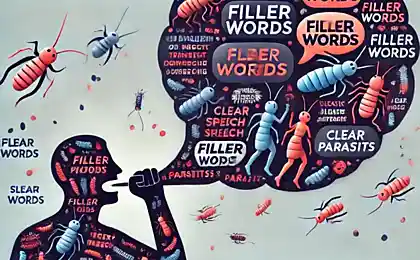291
7 ways to get rid of platitudes in speech and become a good interlocutor
Platitudes make speech inconclusive and annoying, but you can get rid of them to become a pleasant interlocutor.

Introduction: Why is it important to avoid platitudes?
In today’s world, the ability to express one’s thoughts convincingly and interestingly can become a gateway to new opportunities, whether it be business negotiations, friendly conversations or public speaking. However, many of us sometimes do not notice how clichés, standard phrases and hackneyed turns appear in our speech. According to the American Psychological Association, monotony It reduces the effectiveness of communication and prevents a person from showing their individuality.
As a result, the conversation turns into a list of used expressions, and the interlocutor becomes bored. Worse, they may feel treated superficially or use formal clichés to quickly “separate.” In this article, we will discuss 7 ways to get rid of platitudes in speech and develop skills that make communication lively and memorable.
Method 1. Reduce the use of clichés and ready phrases
"As they say," "Time will tell," "Don't worry about it" - all these standard phrases may sound disingenuous and devalue the meaning of what was said. To give the speech individuality, replace such expressions with more precise formulations. Instead of “Time will tell,” try saying, “I suggest you wait a week and see how things develop.” Thus, you clearly state your position and intentions.
Recommendation: If during the conversation you notice that you are using clichés, pause and think about how you can reformulate the thought more uniquely. Try to avoid verbal patterns that do not express the true idea.
Method 2. Deepen your knowledge in the topic of conversation
We often resort to platitudes when we have nothing to say. It follows that the deeper you understand the topic under discussion, the less empty words will be in your speech. Study information before an important meeting, read articles, watch videos, get acquainted with different points of view. Then, instead of the banal “It’s very difficult”, you can give a specific example or an interesting fact that enriches the conversation.
According to experts in the field of communication psychology, our interlocutors appreciate when we can disclose the topic. deeply and detailAt the same time, maintaining the logical structure of the narrative. This creates a sense of expertise and involvement. So that speech does not seem dry, use clear examples and personal stories.

Method 3. Work on your vocabulary.
The more lexical tools we have, the easier it is to pick up bright and accurate phrases. Vocabulary is the “pattern of colors” with which we create verbal “pictures”. If the words “missing”, we rely on standard turns. Read fiction, popular science articles, watch lectures and documentaries. Make a habit of writing out unfamiliar words and expressions and then actively incorporating them into your speech.
However, one should not turn communication into a philological mystery, abundantly flavored with archaisms or narrowly professional terms. It is important to find a balance between accessibility and expressiveness, so as not to tire the interlocutor and not seem arrogant.
Method 4. Use specifics instead of general phrases
Compare the two options: “We’re doing well” and “Our sales are up 15% and the team has received positive feedback from customers.” In the second case, you give detailThe ones that make the message compelling. Platitudes usually hide emptiness behind a bright, but meaningless shell. Be accurate in wording, give facts, data and examples. Then your speech will gain weight, and the interlocutor will understand that you care about the reliability of information.
Method 5. Show emotions and individuality
Platitudes often arise from the fear of appearing too emotional or outspoken. But impersonal speech makes communication flat and uninteresting. Allow yourself to express feelings - joy, surprise, curiosity, concern. Use humor in moderation, tell short stories that illustrate your point of view. Then you will. alive And it's a nice conversationalist, not just another robot talking standard phrases.

Method 6. Watch the response of the interlocutor
If you notice that the interlocutor yawns, looks away or in every possible way shows a lack of interest, you may be slipping into repetition of clichés or common words. Do not be afraid to “adapt” to the audience: ask questions to understand what is interesting to your counterpart, and direct the conversation in the right direction. Live interaction helps to avoid patterns, because each dialogue is unique.
According to the researchers, one of the most effective techniques is to mirror the response of the interlocutor. If you see that he is serious, stick to a more formal style. If he's smiling and joking, you can turn on more humor. Mutual adaptation reduces the risk of “failures” in communication and increases the chances of avoiding stereotypical turns.
Method 7. Exercise the ability to formulate thoughts in advance
We often use platitudes when we speak spontaneously and do not have time to think about words. Sometimes 1-2 seconds are enough to formulate a thought more accurately and avoid “duty” phrases. Try practising by writing down arguments on various topics or speaking in front of a mirror. So you will learn to quickly find non-banal expressions, relying on your improved vocabulary and logical structure of speech.
In addition, regular training helps to form a “dictionary of ideas” – a kind of set of interesting stories, facts and observations that you can share during communication. This does not mean that you need to turn a conversation into a lecture, but plug-in Interesting details always enliven the conversation.
Conclusion: awareness in speech is the way to interesting communication
To get rid of platitudes is to begin to be conscious of what you say and how you say it. This approach increases your attractiveness as an interlocutor and brings depth and uniqueness to the dialogue. Instead of a set of on-duty phrases, you begin to communicate sincerely, taking into account the interests of the interlocutor and the context of the situation.
Because ultimately, goodness This is not just an exchange of information, but an interaction of two personalities that can generate new ideas, strengthen mutual understanding and even inspire. If you learn to avoid patterns, delve into the essence, use a variety of speech tools and emotional colors, then you will easily become the person who is listened to with pleasure and respect.

Introduction: Why is it important to avoid platitudes?
In today’s world, the ability to express one’s thoughts convincingly and interestingly can become a gateway to new opportunities, whether it be business negotiations, friendly conversations or public speaking. However, many of us sometimes do not notice how clichés, standard phrases and hackneyed turns appear in our speech. According to the American Psychological Association, monotony It reduces the effectiveness of communication and prevents a person from showing their individuality.
As a result, the conversation turns into a list of used expressions, and the interlocutor becomes bored. Worse, they may feel treated superficially or use formal clichés to quickly “separate.” In this article, we will discuss 7 ways to get rid of platitudes in speech and develop skills that make communication lively and memorable.
Method 1. Reduce the use of clichés and ready phrases
"As they say," "Time will tell," "Don't worry about it" - all these standard phrases may sound disingenuous and devalue the meaning of what was said. To give the speech individuality, replace such expressions with more precise formulations. Instead of “Time will tell,” try saying, “I suggest you wait a week and see how things develop.” Thus, you clearly state your position and intentions.
Recommendation: If during the conversation you notice that you are using clichés, pause and think about how you can reformulate the thought more uniquely. Try to avoid verbal patterns that do not express the true idea.
Method 2. Deepen your knowledge in the topic of conversation
We often resort to platitudes when we have nothing to say. It follows that the deeper you understand the topic under discussion, the less empty words will be in your speech. Study information before an important meeting, read articles, watch videos, get acquainted with different points of view. Then, instead of the banal “It’s very difficult”, you can give a specific example or an interesting fact that enriches the conversation.
According to experts in the field of communication psychology, our interlocutors appreciate when we can disclose the topic. deeply and detailAt the same time, maintaining the logical structure of the narrative. This creates a sense of expertise and involvement. So that speech does not seem dry, use clear examples and personal stories.

Method 3. Work on your vocabulary.
The more lexical tools we have, the easier it is to pick up bright and accurate phrases. Vocabulary is the “pattern of colors” with which we create verbal “pictures”. If the words “missing”, we rely on standard turns. Read fiction, popular science articles, watch lectures and documentaries. Make a habit of writing out unfamiliar words and expressions and then actively incorporating them into your speech.
However, one should not turn communication into a philological mystery, abundantly flavored with archaisms or narrowly professional terms. It is important to find a balance between accessibility and expressiveness, so as not to tire the interlocutor and not seem arrogant.
Method 4. Use specifics instead of general phrases
Compare the two options: “We’re doing well” and “Our sales are up 15% and the team has received positive feedback from customers.” In the second case, you give detailThe ones that make the message compelling. Platitudes usually hide emptiness behind a bright, but meaningless shell. Be accurate in wording, give facts, data and examples. Then your speech will gain weight, and the interlocutor will understand that you care about the reliability of information.
Method 5. Show emotions and individuality
Platitudes often arise from the fear of appearing too emotional or outspoken. But impersonal speech makes communication flat and uninteresting. Allow yourself to express feelings - joy, surprise, curiosity, concern. Use humor in moderation, tell short stories that illustrate your point of view. Then you will. alive And it's a nice conversationalist, not just another robot talking standard phrases.

Method 6. Watch the response of the interlocutor
If you notice that the interlocutor yawns, looks away or in every possible way shows a lack of interest, you may be slipping into repetition of clichés or common words. Do not be afraid to “adapt” to the audience: ask questions to understand what is interesting to your counterpart, and direct the conversation in the right direction. Live interaction helps to avoid patterns, because each dialogue is unique.
According to the researchers, one of the most effective techniques is to mirror the response of the interlocutor. If you see that he is serious, stick to a more formal style. If he's smiling and joking, you can turn on more humor. Mutual adaptation reduces the risk of “failures” in communication and increases the chances of avoiding stereotypical turns.
Method 7. Exercise the ability to formulate thoughts in advance
We often use platitudes when we speak spontaneously and do not have time to think about words. Sometimes 1-2 seconds are enough to formulate a thought more accurately and avoid “duty” phrases. Try practising by writing down arguments on various topics or speaking in front of a mirror. So you will learn to quickly find non-banal expressions, relying on your improved vocabulary and logical structure of speech.
In addition, regular training helps to form a “dictionary of ideas” – a kind of set of interesting stories, facts and observations that you can share during communication. This does not mean that you need to turn a conversation into a lecture, but plug-in Interesting details always enliven the conversation.
Conclusion: awareness in speech is the way to interesting communication
To get rid of platitudes is to begin to be conscious of what you say and how you say it. This approach increases your attractiveness as an interlocutor and brings depth and uniqueness to the dialogue. Instead of a set of on-duty phrases, you begin to communicate sincerely, taking into account the interests of the interlocutor and the context of the situation.
Because ultimately, goodness This is not just an exchange of information, but an interaction of two personalities that can generate new ideas, strengthen mutual understanding and even inspire. If you learn to avoid patterns, delve into the essence, use a variety of speech tools and emotional colors, then you will easily become the person who is listened to with pleasure and respect.
Secret codes of the body: how to decipher what the words are silent about
Why the brain is fixated on the bad and how to reprogram the internal algorithm























